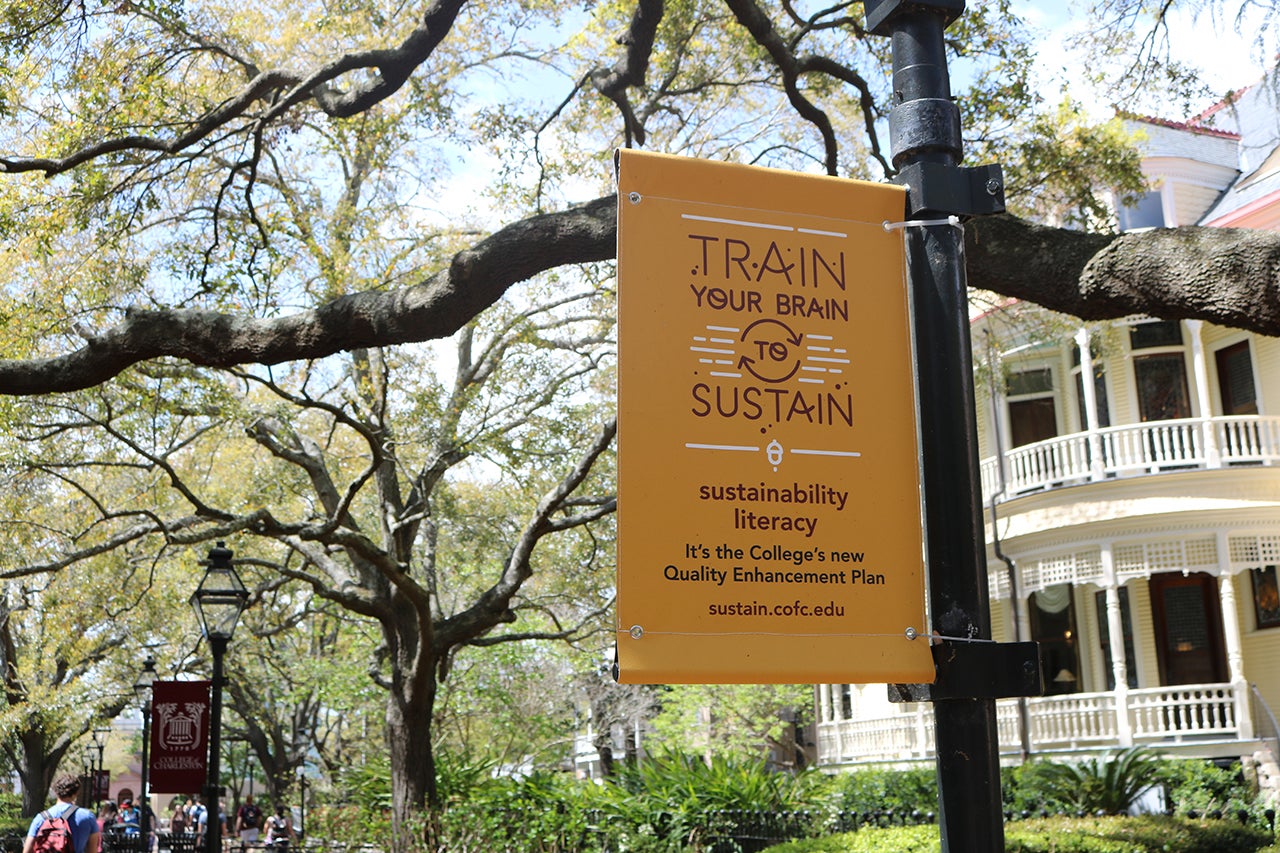If you’ve strolled around campus this semester, you know the College of Charleston is emphasizing sustainability literacy.
The topic is the core of the College’s new Quality Enhancement Plan, “Sustainability Literacy as a Bridge to Addressing 21st Century Problems.” This means the College is intent on giving students the knowledge and tools they’ll need to cope with and address big issues that will come in the decades to come.
According to Todd LeVasseur, the director of the Quality Enhancement Plan, those problems can include the many effects of climate change, including erratic storms, biodiversity loss and sea-level rise; various forms of social injustice; and the numerous impacts of increasing economic inequality.

Posters, banners and other signage signifying sustainability literacy have been popping up around campus for months.
“When our students leave the College, they’ll be confronted by these very complex issues,” LeVasseur says. “We want them to be equipped not only to cope with these challenges, but to be effective change agents who can work to resolve many of these issues. That’s going to be important for all of us, but particularly for our students’ future.”
RELATED: Sustainability at CofC
One way to calculate sustainability literacy in students will be the courses they take. LeVasseur and his colleagues have been developing a new slate of what they’re calling Triple Bottom Line courses that reflect the environmental, social and economic systems that underlie sustainability. Those courses will be either sustainability-focused — that is, solely covering two or more of those systems and their interactions — or sustainability-related, meaning they address sustainability as a smaller part of an overall course.
These classes, which will be offered beginning next fall, span the full spectrum of the College’s offerings, from the arts and humanities to business and sciences.
RELATED: Art Exhibit Showcases Sustainability at the College

Sustainability messages have been featured throughout campus, including on the Sottile Theatre marquee.
Some of the new sustainability-focused courses include “Talking About Water: Communication Planning for Sustainable Use in Local Communities,” an upper level communication course; “Biomimicry: Nature as Mentor,” a biology seminar for freshmen; “Green Supply Chain Management,” an upper-level course taught in the School of Business; and “The Calamitous Fourteenth Century,” a history course that will examine the environmental and societal factors that determined events in medieval history.
In all, more than 30 new courses have been developed to support the Quality Enhancement Plan. But there have been courses on sustainability at the College for a long time.
RELATED: Sustainability Efforts Ramp Up at CofC
Students have been able to enroll in environmental studies and social justice courses for decades. In the School of Business, David Hansen has been teaching his ecopreneurship course for nearly a decade. And Brian Fisher, the director of the Office of Sustainability, has been teaching a variety of sustainability courses since 2010. The list of courses he’s taught range from “Sustainable Development” to “Security and Sustainability” to a special topics course on “The Tao of Living.”
“Our new slate of sustainability-focused and sustainability-related courses will complement and augment the many courses that are already taught in this realm at the College,” LeVasseur explains. “This course-infusion strategy is just one of the many steps we are taking to ensure that students will ultimately become sustainably literate.”
Check here for additional information about the College’s new initiative on sustainability literacy.
Featured photo by Erin Perkins




